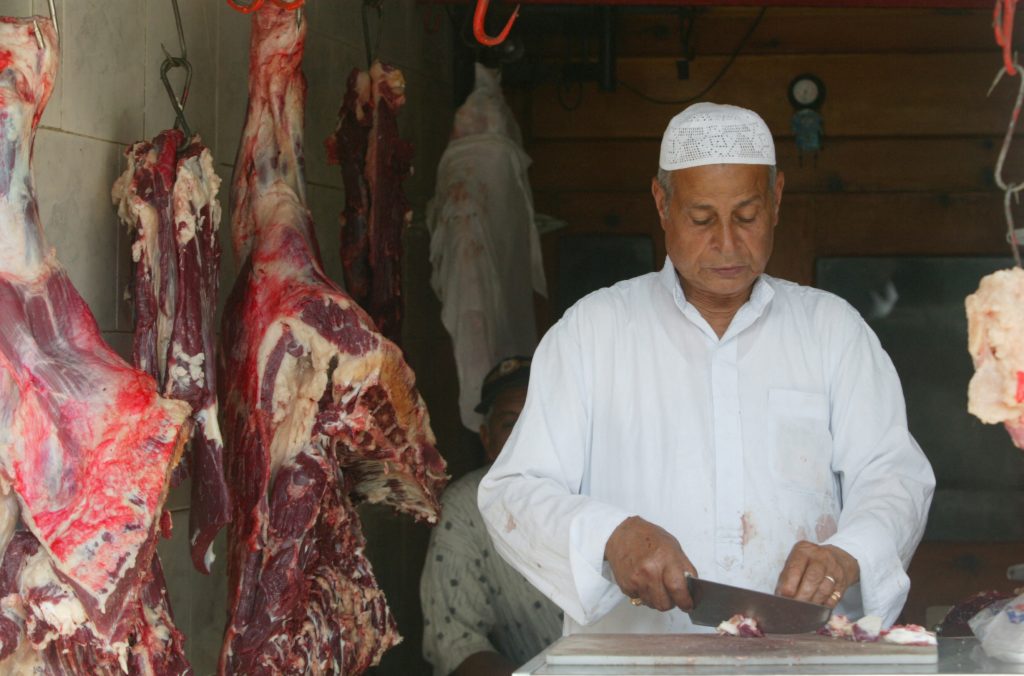Cairo – Egypt is seeing a sharp increase in beef prices. Cattle ranchers and retailers assign the rise to different factors, including soaring cattle feed prices affected by the global rise in prices of raw materials like maize, soy and additives.
A cattleman who asked to remain anonymous said that the cattle market experiences an unprecedent phase when prices soar despite a decreasing demanding. But farmers are forced to increase prices because of the increasing prices of all production inputs.
Mohamed Wahba, chief of the butchers’ division of the Federation of Egyptian Chambers of Commerce, said that beef prices in the country increases weekly, pressured by global successive increases in raw materials used to produce feed and the shortage of beef in the market.
Weekly price increases
Wahba said the situation of the beef market is unprecedent. Prices used to dramatically drop following the holy day of Eid al-Adha, when demand falls sharply, but the situation this year is absolutely atypical, as successive rises are occurring despite a lower demand.
Veal prices went from EGP 150 to 170 (USD 9,5 to 10,8) in popular areas while rising from EGP 170 to 180 (USD 10,8 to 11,4) in higher income neighborhoods in the last couple of weeks. The price for a kilo of lamb went from EGP 160 to 180 (USD 10,1 to 11,4) before last Eid al-Adha. The price for a kilo of camel went from EGP 90 (USD 5,7) to EGP 100-120 (USD 6-8).
In addition to increasing prices of fodder and other inputs, the chief of the butchers’ division attributed the rise to increasing costs of international shipping, as Egypt relies on raw material imports.
Wahba explained that the living cattle prices also soared, from EGP 60 (USD 3,8) a gross kilo to EGP 70 (USD 4,4), with cattle prices impacting slaughterhouses.
He explained that the returning demand contributed to the soaring prices, as meat stocks ran out for Edi al-Adha, which saw the slaughter of a large number of animals.
Funding: Veal prices
Alsayid Al-Qaseer, the Egyptian minister of Agriculture and Land Reclamation, said in a press statement last week that the total financing of a national veal project surpassed EGP 5.6 billion (USD 356 million), benefiting around 35,000 farmers and contributing to breeding and fattening over 380,000 head of cattle. The total was reached after making a new financing of veal meat at EGP 128.3 million (USD 8.1 million), thus benefiting 711 small and young farmers with a total of 8,570 head of cattle.
Imports
On the relation between decreasing frozen beef imports and soaring prices, Mohamed Rehan, a member of the butchers’ division of the Federation of Egyptian Chambers of Commerce, said there’s no doubt that imported beef provides balance to the market, as Egypt heavily relies on living cattle and frozen beef imports to bridge the gap between production and consumption.
He said there’s a large segment of consumers, restaurant, hotels and tourist developments that rely on high-quality imported beef. According to Rehan, there’s also a range of consumers that rely on imported frozen meat from Brazil and India, whose prices are lower than national meat prices.
Frozen beef imports from Brazil to Egypt declined year to date through August to 141,000 tonnes from 288,000 tonnes a year ago, which means a 51% decline, as per official figures from the Ministry of Agriculture of Egypt.
Beef imports from Indian to Egypt stepped up year to date through August to 120,000 tonnes from whole year’s 75,000 in recent years.
Translated by Guilherme Miranda




